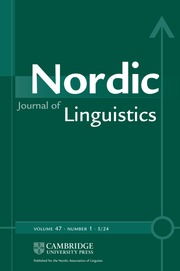The second issue of volume 35 (2012) of the Nordic Journal of Linguistics will be a special issue devoted to Case Variation and Change in the Nordic Languages, edited by Jeffrey K. Parrott.
Nominal case inflection potentially involves aspects of semantics, syntax, morphology, and phonology, and therefore case has been a central concern for linguistic description and theory. Nordic language varieties offer an empirically rich laboratory in which to address various theories of case. Within two distinct language families (Germanic and Uralic) are dozens of closely related language varieties, all having either adpositional case, ‘transparent’ case inflection on a wide range of nominal elements (e.g., Insular Scandinavian), or ‘vestigial’ case forms that are limited to a subset of personal pronouns (i.e., Mainland Scandinavian). In addition to the significant inter-individual (i.e., cross-linguistic or dialectal) variation among Nordic case systems, for example, the dative pronominal clitics and variable syncretism patterns found in certain Norwegian and Swedish varieties, a great deal of intra-individual (i.e., sociolinguistic or Labovian) variation is attested; however, some instances, such as Icelandic Nominative Substitution or ‘Dative Sickness’, are more well known than others, like Danish variable case-form mismatches in coordinate nominal phrases. It is furthermore possible to view extant case systems – which range from adpositional to transparent to vestigial – as a progression of stages in a hypothetical change over time (e.g., Finnish/Sami → Icelandic → Faroese → Älvdalian → Norwegian/Swedish → Danish). Using the empirical methodologies of variationist sociolinguistics to study intra-individual case variation allows the observation of such case changes in progress, in both real and apparent time.
In generative theoretical frameworks, abstract syntactic Case is standardly taken to be a part of Universal Grammar, varying only in its language-specific morphophonological realization. Although specific analyses have evolved over the years, the primary role of Case has always been to license the syntactic position and movement of nominal phrases. With few exceptions, empirical observation of morphological case variation has not significantly altered this conception of syntactic Case. In recent years, however, linguists working in Distributed Morphology and other frameworks have begun to challenge such analyses. One emerging hypothesis holds that case morphology is determined post-syntactically at the interpretive perceptual-form interface, which provides nominal elements with language-specific features and phonological exponents based on their argument structure or other syntactic context. In contrast to syntactic theories, observed patterns of variation and morphology–syntax mismatches have been important in spurring alternative morphological approaches to case.
Papers concerned with any of these or related issues of case variation are hereby invited. Authors may address empirical methodologies, novel data, or theoretical matters in any framework, regarding inter- or intra-individual variation, or changes in progress, in or among any of the Nordic language varieties. Manuscripts in standard formats (e.g., .doc or .pdf) should be submitted by 1 January 2012 to the guest editor:
Jeffrey K. Parrott
Center for Sociolingvistiske Sprogforandringsstudier (DGCSS)/LANCHART Centre
Københavns Universitet
Njalsgade 136, 27.5
DK-2300 København S
Danmark


